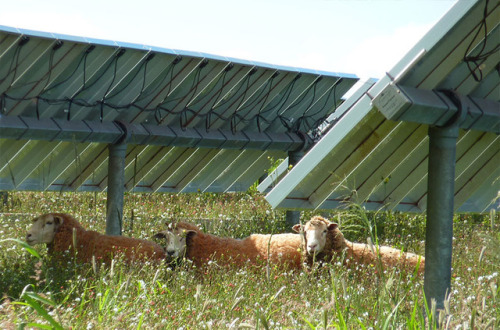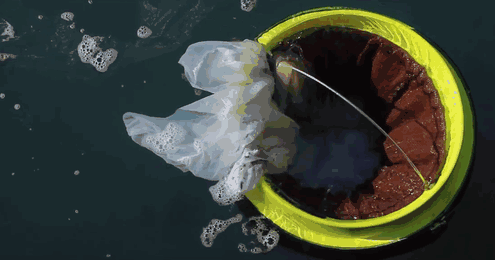I've Just Now Found Out About The Amazing Autumn Peltier. She Deserves So Much More Coverage Than I've


I've just now found out about the amazing Autumn Peltier. She deserves so much more coverage than i've seen.
More Posts from Green-notebooks and Others




Neglected pastures thrive under solar panels
Solar panels could increase productivity on pastures that are not irrigated and even water-stressed, a new study finds. The new study published in PLOS One by researchers at Oregon State College finds that grasses and plants flourish in the shade underneath solar panels because of a significant change in moisture. The results bolster the argument for agrovoltaics, the concept of using the same area of land for solar arrays and farming. The idea is to grow food and produce clean energy at the same time.
But seriously, when we got our property, it was all just…grass. A sterile grass moonscape, like a billion other yards. With two big old maple trees. Just grass and maples, that was it.
But then I got my grubby little paws on it, and I immediately stopped fertilizing, spraying, and bagging up grass clippings and leaves. I ripped up sod and put in flowers and vegetables. I put down nice thick blankets of mulch around the flowers and vegetables.
When I first was sweating my way through stripping sod, I saw a grand total of 1 worm and 0 ladybugs. The ground was compacted into something that would bend shovel blades.
Now, six years later, I can’t dig a planting hole without turning up fourteen earthworms, and there are so many ladybugs here. Not the invasive asian lady beetles; native ladybugs. They winter over in the mulch and in the brush pile. I see thousands of them.
The soil is soft and rich. There are birds that come to eat, and bees of many sorts.
Like this is something that you, yourself, can absolutely change. This is something that you, personally, can make a difference in.

“The project was designed to transform a wide, automobile-oriented thoroughfare to a pedestrian-friendly, neighborhood center.
Travel lanes were reduced from five to two while adding five modern roundabouts, improved sidewalks, medians, landscaping, and increased angle parking. Traffic calming measures were installed on less busy side and parallel streets to avoid potential traffic diversion.“
Here’s the before and after:


“Pedestrians once had 70 feet of pavement to cross at intersections. With the roundabouts, they now cross 12–14 feet of pavement at a time with refuge islands in the middle”
“due to the 15 mph design speed of the roundabouts and traffic calming, many bicyclists feel comfortable riding with traffic on La Jolla Boulevard“
“The traffic count remained approximately the same (23,000 vehicles per day before, 22,000 after), but walking, bicycling, transit use, on-street parking and retail sales all climbed to much higher levels, the city reports. Retail sales rose 30 percent and noise levels dropped 77 percent. Because traffic moves slower, businesses report higher visibility.
As a result of the roundabouts and traffic calming, speeds were reduced from 40–45 mph to 19 mph, according to city transportation engineers. “The once busy boulevard has been transformed into a slow-paced street with roundabouts, landscaped street dividers and diagonal parking,” notes the LaJolla Light
Traffic crashes fell by 90 percent. The project has helped revitalize La Jolla Boulevard, acting as a catalyst to several new mixed-use developments, a 139-unit condominium development, and a major drugstore.
“Motorists,” Burden reported in The San Diego Union- Tribune in February 2017, “understandably dreaded this change before it was made. But they found that instead of waiting 24 seconds for a pedestrian to cross 70 feet of road, they now only wait 3–4 seconds, or don’t have to wait at all. Businesses that feared the loss of customers arriving in cars actually improved their trade. … Today motorists are getting to their destinations in less time, because they aren’t stopping.”“
(I’ve added bold for emphasis; the above sections are taken from different parts of the article, click through the link for the whole thing)
This goes to show that designing for a better pedestrian experience is not only safer, but also good for the local economy.
Probably the saddest sign of our times is how many people respond with complete bewilderment if you mention direct action. Cutting border fences? punching nazis? sharing resources? blocking arms transports? building alternatives? They’re not even outraged, they’re just confused.
It’s like they’re so caught up in the spectacle of petitions, calling senators, ‘awareness’ and media visbility that they’ve completely forgotten that you can also just do shit without begging for permission.
This Week @ NASA--April 14, 2017
Cassini and the Hubble Space Telescope, two of our long-running missions, are providing new details about the ocean-bearing moons of Jupiter and Saturn. Hubble’s monitoring of plume activity on Europa and Cassini’s long-term investigation of Enceladus are laying the groundwork for our Europa Clipper mission, slated for launch in the 2020s. Also, Shane Kimbrough returns home after 171 days aboard the Space Station, celebrating the first Space Shuttle mission and more!

Ocean Worlds
Our two long-running missions, Cassini and the Hubble Space Telescope, are providing new details about “ocean worlds,” specifically the moons of Jupiter and Saturn.

The details – discussed during our April 13 science briefing – included the announcement by the Cassini mission team that a key ingredient for life has been found in the ocean on Saturn’s moon Enceladus.

Meanwhile, in 2016 Hubble spotted a likely plume erupting from Jupiter’s moon Europa at the same location as one in 2014, reenforcing the notion of liquid water erupting from the moon.

These observations are laying the groundwork for our Europa Clipper mission, planned for launch in the 2020s.

Welcome Home, Shane!
Shane Kimbrough and his Russian colleagues returned home safely after spending 173 days in space during his mission to the International Space Station.

Meet the Next Crew to Launch to the Station
Meanwhile, astronaut Peggy Whitson assumed command of the orbital platform and she and her crew await the next occupants of the station, which is slated to launch April 20.

Student Launch Initiative
We’ve announced the preliminary winner of the 2017 Student Launch Initiative that took place near our Marshall Space Fight Center, The final selection will be announced in May. The students showcased advanced aerospace and engineering skills by launching their respective model rockets to an altitude of one mile, deploying an automated parachute and safely landing them for re-use.

Langley’s New Lab
On April 11, a ground-breaking ceremony took place at our Langley Research Center for the new Systems Measurement Laboratory. The 175,000 square-foot facility will be a world class lab for the research and development of new measurement concepts, technologies and systems that will enable the to meet its missions in space explorations, science and aeronautics.

Yuri’s Night
Space fans celebrated Yuri’s Night on April 12 at the Air and Space Museum and around the world. On April 12, 1961, cosmonaut Yuri Gagrin became the first person to orbit the Earth.

Celebrating the First Space Shuttle Launch
On April 12, 1981, John Young and Bob Crippin launched aboard Space Shuttle Columbia on STS-1 a two-day mission, the first of the Shuttle Program’s 30-year history.

Watch the full episode:
Make sure to follow us on Tumblr for your regular dose of space: http://nasa.tumblr.com

Cleaning the oceans one step at a time
Two Australians created this container that collects plastic, paper, oil, fuel and detergent floating in the ocean. They want to implement it the middle of next year to clean up the sea worldwide. It seems a great idea. The only “but” as always is money, so they are raising funds to get to their goal. You can see their project and donations here.
-
 jezabatlovesbats liked this · 4 months ago
jezabatlovesbats liked this · 4 months ago -
 teapoetryx liked this · 1 year ago
teapoetryx liked this · 1 year ago -
 ama-mori liked this · 1 year ago
ama-mori liked this · 1 year ago -
 wirsubsdistbert liked this · 1 year ago
wirsubsdistbert liked this · 1 year ago -
 sophrosynn reblogged this · 3 years ago
sophrosynn reblogged this · 3 years ago -
 rs-likes reblogged this · 3 years ago
rs-likes reblogged this · 3 years ago -
 lukasspookas liked this · 3 years ago
lukasspookas liked this · 3 years ago -
 teacup-universe reblogged this · 3 years ago
teacup-universe reblogged this · 3 years ago -
 teacup-universe liked this · 3 years ago
teacup-universe liked this · 3 years ago -
 andossp reblogged this · 3 years ago
andossp reblogged this · 3 years ago -
 ravenmirror reblogged this · 3 years ago
ravenmirror reblogged this · 3 years ago -
 wellshitcaitlin reblogged this · 3 years ago
wellshitcaitlin reblogged this · 3 years ago -
 tragicgrantaire liked this · 3 years ago
tragicgrantaire liked this · 3 years ago -
 kevinallenblog reblogged this · 3 years ago
kevinallenblog reblogged this · 3 years ago -
 cowboylikeme789 liked this · 3 years ago
cowboylikeme789 liked this · 3 years ago -
 rosekki liked this · 3 years ago
rosekki liked this · 3 years ago -
 yay-depression reblogged this · 4 years ago
yay-depression reblogged this · 4 years ago -
 yay-depression liked this · 4 years ago
yay-depression liked this · 4 years ago -
 sheisbeautifulwhensheisangry reblogged this · 4 years ago
sheisbeautifulwhensheisangry reblogged this · 4 years ago -
 maxdartdack liked this · 4 years ago
maxdartdack liked this · 4 years ago -
 ppaauullaa liked this · 4 years ago
ppaauullaa liked this · 4 years ago -
 andromedapromesium reblogged this · 4 years ago
andromedapromesium reblogged this · 4 years ago -
 a-mottled-sculpin reblogged this · 4 years ago
a-mottled-sculpin reblogged this · 4 years ago -
 mkenz1 liked this · 4 years ago
mkenz1 liked this · 4 years ago -
 iisaeii reblogged this · 4 years ago
iisaeii reblogged this · 4 years ago -
 vocal-eyes reblogged this · 4 years ago
vocal-eyes reblogged this · 4 years ago -
 calicoism liked this · 4 years ago
calicoism liked this · 4 years ago -
 gabbagabbabun liked this · 4 years ago
gabbagabbabun liked this · 4 years ago -
 crypticphysicist liked this · 4 years ago
crypticphysicist liked this · 4 years ago